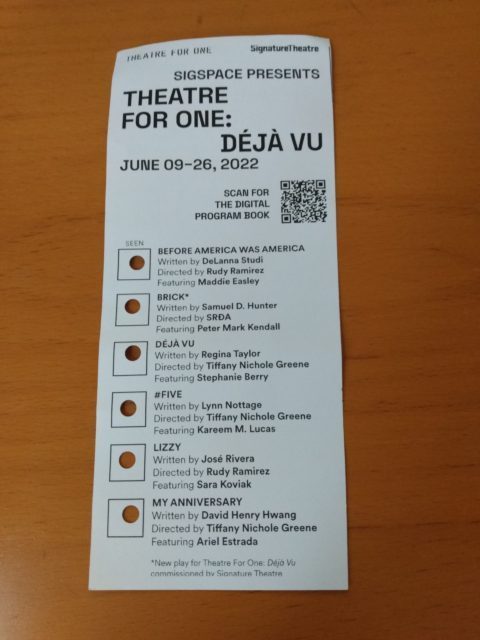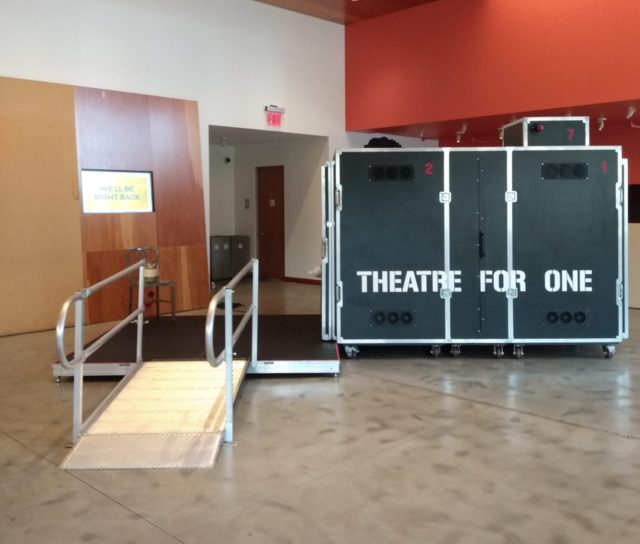
Kareem M. Lucas portrays a man sharing a terrible moment from his past in Lynn Nottage’s #Five (photo by Jonathan George)
SIGSPACE X THEATRE FOR ONE: DÉJÀ VU
The Pershing Square Signature Center
480 West 42nd St. between Tenth & Eleventh Aves.
Thursday – Sunday through June 26, free with advance RSVP
www.signaturetheatre.org
theatreforone.com
“It’s déjà vu all over again,” Yogi Berra famously said. But that’s not necessarily a bad thing, as evidenced by the welcome return of Theatre for One.
Since 2010, Christine Jones’s Theatre for One has been on the move in New York City, offering microplays performed by one actor (“performer”) for one audience member (“audiencer”) at a time in a mobile four-by-eight-foot repurposed equipment container (with the addition of a floor-to-ceiling plexiglass barrier added because of the pandemic). The specially commissioned works, generally running between five and seven minutes each, have been presented in Times Square, Brookfield Place, the Signature Theatre, and Manhattan West Plaza (“Here Is Future”) as well as at the University of Arkansas, Princeton, Fairfield University, Cork in Ireland, the Abbey Theatre in Dublin, and NYU Abu Dhabi. During the pandemic, “Here We Are” provided a thrilling, much-needed live, online connection between performer and audiencer, both able to see and hear the other and interact.
Theatre for One is now back at the Signature with its latest iteration, “Déjà Vu,” featuring five previously presented short works and one world premiere that can be experienced June 23–26; reservations can be made starting June 21, but you won’t know which play you’ll see until you arrive. (If you’ve already seen at least one play, the friendly staff will try to make sure you see something different if at all possible.) The small booth is bathed in red, with red flowers behind the performer, who often is seated in a chair. (The sets and costumes are by Camilla Dely, with lighting by Domino Mannheim and sound by Matt Stine.) There are no rules, as there are at Broadway and off-Broadway houses; if you want to interact with the performer, you can do so, within limits, of course, always respecting the actor and the playwright.
Stephanie Berry is electric as Pearl in Regina Taylor’s Déjà Vu, an expansion on Taylor’s previous Vote! (The Black Album). “You ever get the feeling that you’ve been here before,” Pearl says. She relates that feeling to the history of women’s voting rights in America after learning that her twenty-one-year-old great-great-granddaughter chose not to cast a ballot in the 2020 presidential election. She recalls the struggle to achieve the right to vote for women, then Blacks, and puts that in context with other societal ills that discriminate against women and people of color. “Time is funny,” she says. “It moves forward and sideways and bends back — over and around again — and again.” Director Tiffany Nichole Greene can barely keep Berry inside the small space as the actor’s voice echoes into the lobby.

“Do you remember the first time you understood the significance of voting? I’m not talking about the first time you voted, but the first time the weight of it hit you?” Sequoyah Jolene Sevenstar (Wyandotte writer, fundraiser, and consultant Maddie Easley) asks in DeLanna Studi’s Before America Was America, an earlier version of which was part of the online “Here We Are.” Directed by Rudy Ramirez, the play discusses women’s rights and equality going back to the Cherokees in the eighteenth century.
Tony winner and two-time Pulitzer finalist David Henry Hwang revisits a terrifying moment from his past, which he also dealt with in his 2019 play Soft Power, in My Anniversary, smartly directed by Greene. Ariel Estrada portrays Hwang, who shares what happened to him on November 29, 2015, and the harrowing aftermath. “I turned around, and thought I saw the shadow of someone, across the street, on the better-lit corner running away,” he remembers. “But as I started in that direction, I noticed something strange. I couldn’t walk straight. . . . I put my hand up to where I’d been hit. When I pulled it away, I saw my palm covered in blood.” The play is particularly potent with the current rise in anti-Asian hate crimes in New York City.
Two-time Pulitzer Prize winner Lynn Nottage also deals with an unprovoked act of horrific violence in #Five, directed by Greene with a tense foreboding. Kareem M. Lucas portrays an unsteady man on a job interview, clarifying why there are five unaccounted-for years on his resume. “I just wanna be upfront,” he says to the audiencer, who is a stand-in for the interviewer. “Things happen, sometimes with little explanation, but I promise you I’m a worker. And to be straight, I’m unhoused, but not for the reasons you probably imagine. I’m telling you, cuz folks are quick to jump to crazy conclusions.” You’re likely to jump to conclusions as well until you hear the full, captivating story.

Theatre for One welcomes one audience member at a time to a live microplay at the Signature (photo by twi-ny/mdr)
José Rivera’s Lizzy, directed by Ramirez, puts you opposite the title character (Sara Koviak) at a restaurant as you both prepare to order. “A lot’s happened that you missed,” she says. “I’m not blaming you for missing anything, I know it’s not your fault, but, you know, it was so sudden. No one told me how sick she really was. Not for a long time.” Although she never specifically mentions Covid-19, it is a potent reminder of how many older people have been lost during the coronavirus crisis. Lizzy focuses on her mother’s hands, on the human need for physical touch, which was not permitted during the height of the pandemic — and, of course, is not allowed between performer and audiencer.
Samuel D. Hunter follows up his extraordinary A Case for the Existence of God, which ran at the Signature this past spring, with the brand-new, gentle Brick, directed by SRĐA. Peter Mark Kendall plays Brick, who holds up an old photograph from the 1940s as he recalls his time in the army and when he found out that Hunter was gay. He self-referentially explains why the microplay exists: “I’m just saying it now in this monologue that my grandson Sam wrote, trying his best to remember how I talked, ’cause I always believed that when you go through something bad you just never talk about it and eventually you feel better — which, this is Sam talking now, is a multigenerational toxic trait that I hope to end with my own daughter.” Kendall delivers the lines in a near-whisper, emphasizing how unsure the character is of wanting to share his personal tale. But Sam and Brick leave you with a final, compassionate thought about how we all should approach life in these difficult times.
In his 2001 novel, Choke, Chuck Palahniuk wrote, “There’s an opposite to déjà vu. They call it jamais vu. It’s when you meet the same people or visit places, again and again, but each time is the first. Everybody is always a stranger. Nothing is ever familiar.” In many ways, this iteration of Theatre for One is a kind of unique melding of déjà vu and jamais vu, offering an unforgettable experience, like the best of theater can do.